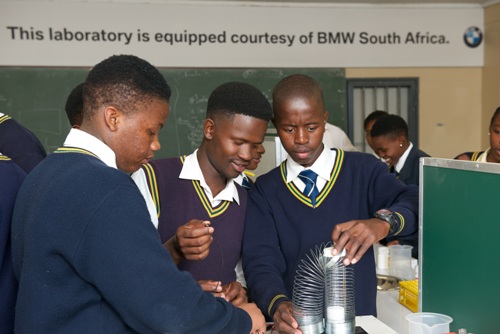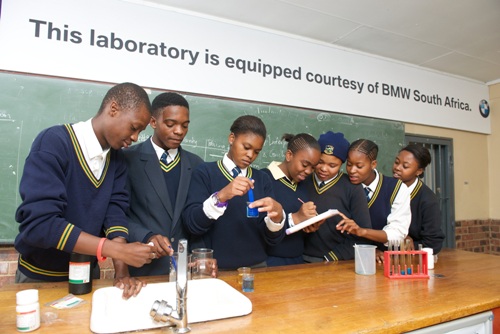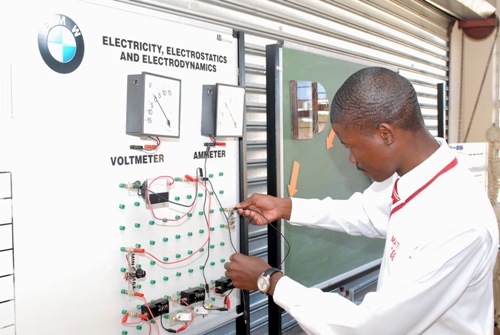BMW South Africa’s Maths, Science and Technology Excellence Project outperformed the national average

Midrand – BMW South Africa’s Mathematics, Science and Technology (MST) class of 2013 has once again yielded outstanding matric results with 37 distinctions in Mathematics and Physical Science proving that investment in education can deliver tangible results and change lives.
The BMW MST Excellence Project, which has been in existence for more than 20 years, deploys mobile laboratories, known as BMW Centres of Excellence, to participating schools, and has been implemented in 37 schools that serve historically disadvantaged communities. As a result, more than 40 000 learners and 148 teachers are direct beneficiaries of the project.
Bodo Donauer, Managing Director for BMW South Africa said, “The performance of the schools in the programme has exceeded our expectations and have improved on the pass rate averages from 2012 by more than 13% and 25% for Physical Science and Mathematics respectively.”
“We at BMW are passionate about education in our country and fully believe in equipping learners with the tools they need for their careers. The aim of the BMW MST Excellence Project is to not only achieve good pass rates but to encourage our learners to excel, which is evident in the number of distinctions achieved over the past two years through our Project,” says Donauer. “Forming a strong foundation at high school level is fundamental in ensuring learners qualify for tertiary education and go on to cement their future,” says Donauer.
The MST Project also focuses on supporting scholars in their bid to earn university educations. A key element of the BMW MST Excellence Project is the provision of tertiary level bursaries for students who wish to continue their studies in engineering, ICT and commerce. Upon completion of their degrees, these students become eligible for a position in BMW’s 24-month Graduate Trainee Programme, which often results in full-time employment within one of the company’s many divisions.
Donauer added that in addition to the dedication and hard work of the principals and teachers at the schools, the success of the programme is largely attributed to the provision of high quality teaching and learning resources as well as high intensity, direct, individualised support to schools and teachers by the BMW MST team throughout the year.
Results
In addition to the distinctions obtained, the core schools under the wing of the BMW MST Excellence Project achieved the following results:
- Overall pass rate 17% higher than national average for similar quintile 123 schools and 10.8% higher than national average that includes Model B and C
- Physical Science pass rate 17.8% higher than national quintile 123 and 11% Higher than national average that includes Model C
- Mathematics pass rate is 27% higher than national quintile 123 and 19% higher than national average that includes Model C
- It is important to note that the class of 2013 BMW MST (88.8%) has outperformed the national average even though the national average itself improved in 2013 (78.2%) over 2012 (73.9%). These national averages include the previous Model C schools.
“We are very proud of the progress made by the vast majority of schools which are part of the BMW MST Excellence Project. As an engaged and committed corporate citizen for the past 40 years, BMW South Africa remains committed to the development and training of all our teachers and the overall educational growth of our learners in 2014,” concludes Donauer.
BMW MST Schools
The BMW MST schools are divided into three groups – the BMW Core Schools, Recovering Schools and New Schools – so that the project team may better understand and contextualise the schools’ performance according to their unique circumstances.
BMW South Africa has been working with a number of Core Schools for more than three years and through the MST project has been able to stabilise teacher development programmes and shift teacher skills to a higher level.
The Recovering Schools have been identified as having severe problems related to teacher skills. In addition, they serve communities which have a particularly low average household income and parental involvement. These schools were placed in a special recovery programme and the issue of skills were addressed in 2012 with intensive induction programmes for learners as well as robust mentorship and professional development programmes for inexperienced teachers.
To add to the portfolio of schools BMW South Africa assists, the Kwa-Zulu Natal Department of Education identified two new schools last year which were in the most destitute of situations, both in terms of teacher skills and extreme poverty levels which are compounded by almost zero communications and roads infrastructure.






